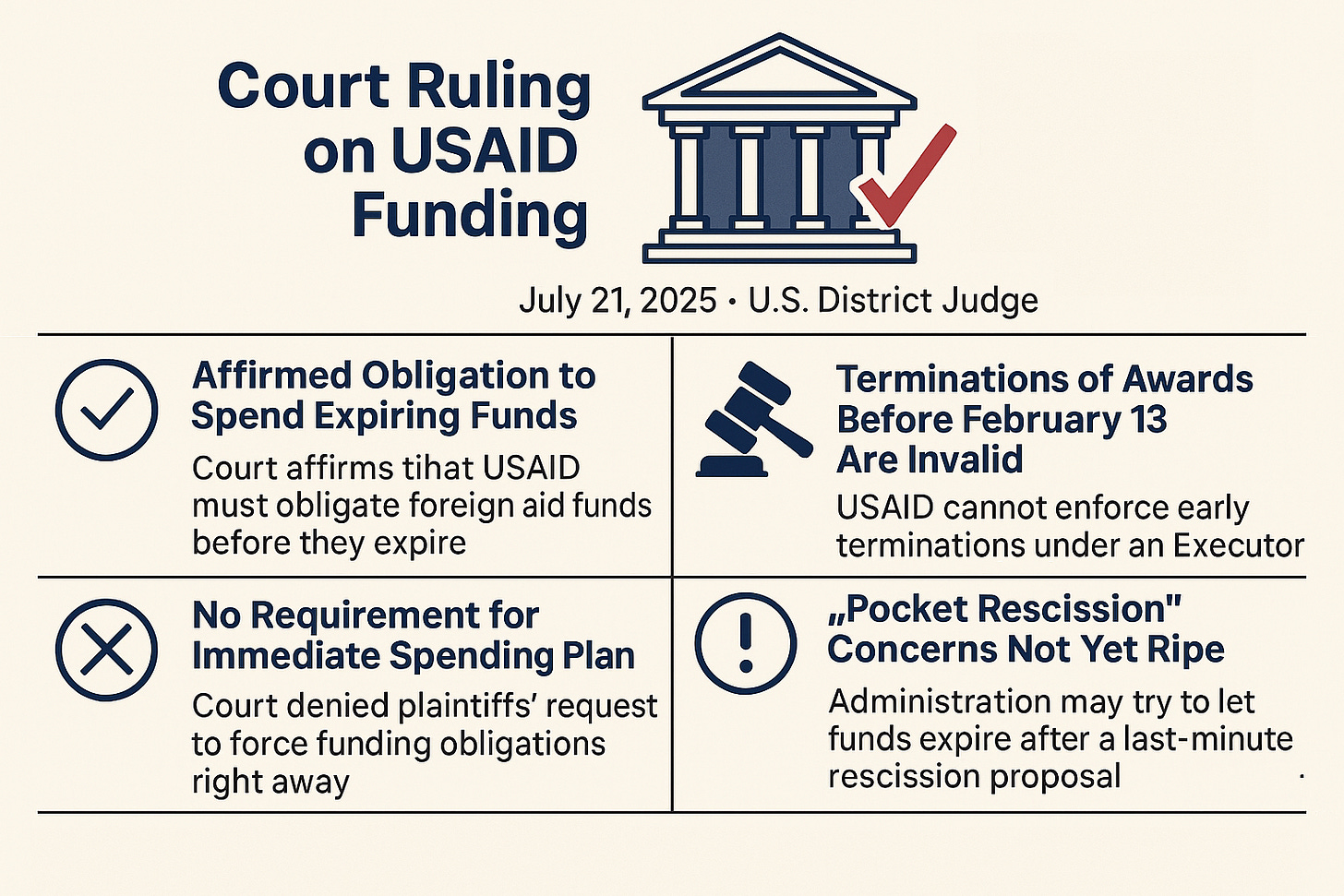Impossible Math: Can State Department Spend $21 Billion in 10 Weeks?
A stress test of the federal government's ability to execute at unprecedented scale under impossible conditions.
We're about to watch the federal government attempt the equivalent of drinking from a fire hose while riding a unicycle.
Last week, Congress passed a rescission package clawing back $9 billion in foreign aid funding, but PEPFAR was spared after pushback from Republicans like Susan Collins. The original proposal would have cut $400 million from PEPFAR's $6 billion budget.
Even better news! A federal district court just reaffirmed that the Trump administration's freeze on foreign assistance violated both the Constitution and the Impoundment Control Act.
The court ordered agencies to obligate all expiring FY24 foreign aid funds and blocked the termination of 462 contracts and grants that were canceled between January 20 and February 13.
But how exactly is this going to work?
Court Ordered Funding Fantasy
The court was explicit: the USG must obligate all expiring foreign assistance appropriations consistent with Congress's directives.
The court and the DC Circuit are working toward an August 15 deadline to resolve the constitutional questions on executive authority. That’s when USAID has said it will start obligating funds.
Government lawyers have repeatedly told both the district court and the D.C. Circuit that they can obligate the funds, even with a decision as late as August 15.
But the judge seemed skeptical, asking if the government will say, “Oh, wait, we only have a short amount of time now, there's no way we could possibly do that!" The government insisted that there will be sufficient time to obligate funds and that they already made preparations to obligate expiring foreign assistance funds.
Um, really?
This would be a miracle with a functional USAID and established implementing partnerships, not the current wreckage.
The Numbers Don't Add Up
Let's be brutally honest about what we're facing.
The unobligated balance in bilateral economic assistance at the end of March was approximately $27 billion. The rescissions package covers about $6 billion, which means agencies need to obligate at least $21 billion by September 30.
Yet we have a few problems.
Lack of Contract Vehicles: There have been no major foreign assistance procurements since March—have you looked at SAM.gov or Grants.gov recently?—and we're in the middle of a massive bureaucratic crisis.
Minimal Staff Capacity: The State Department will have 718 staff tasked to support programs formerly managed by USAID—that's about six percent of USAID's staffing to handle 62 percent of their obligations. Meanwhile, State just shed 3,500 of its existing staff while trying to build up new functions and capabilities.
Insane Workload Expectations: State Department contracting officers will be responsible for about $260 million of awards each, compared to $65 million per contracting officer at USAID in 2022. Now compare that to the DoD, where contracting officers manage an average of $15 million in contracts each.
What About Implementation Partners?
Think about what we're asking implementing partners to do.
After six months of uncertainty, staff layoffs, and contract terminations, we expect organizations to gear up for a 10-week sprint to spend billions of dollars—knowing they'll likely face another round of cuts when the fiscal year ends on September 30.
Many of these organizations are shells of their former selves. Staff who were laid off aren't sitting around waiting for a call back. They've moved on, found other jobs, or left the sector entirely.
The Rescission Threat
Even if agencies somehow manage to obligate these funds, we're not out of the woods.
The administration has already demonstrated it can get Congress to pass a rescissions package—they just did it with the $9 billion cuts. What's to stop them from trying again with the September 30 deadline looming?
The court specifically addressed concerns about a pocket rescission—where the administration could send a rescission proposal to Congress fewer than 45 days before funds expire, then claim the funds expired during the 45-day period, relieving them of obligation requirements.
A pocket rescission can still trap and kill funding before Sept 30th.
Get Your Popcorn Ready
PEPFAR funding survived, and that's worth celebrating. The court order blocking illegal impoundment is a victory for constitutional governance.
But we're about to witness a stress test of the federal government's ability to execute at unprecedented scale under impossible conditions.
About 500 of the 836 USAID awards transferred to State will expire by September 30.
What’s left of implementation partners are being asked to trust the system again for a 10-week sprint to a dead end.
The FY26 foreign assistance funding request holds no hope for them (or us).
We need to watch this closely. Every obligation, every contract, every program restart.
Because if this administration can't execute on its legal obligations by September 30, they'll have proven that their real goal was never efficiency—it was ending American leadership in foreign assistance.



